Govind Damodar Stotram | गोविन्द दामोदर स्तोत्र meaning in Hindi and English
For getting the bhakti of Lord Krishna read this every day and see the magic!
Kindly subscribe to our other channel Ancientry for getting bhakti-related content!
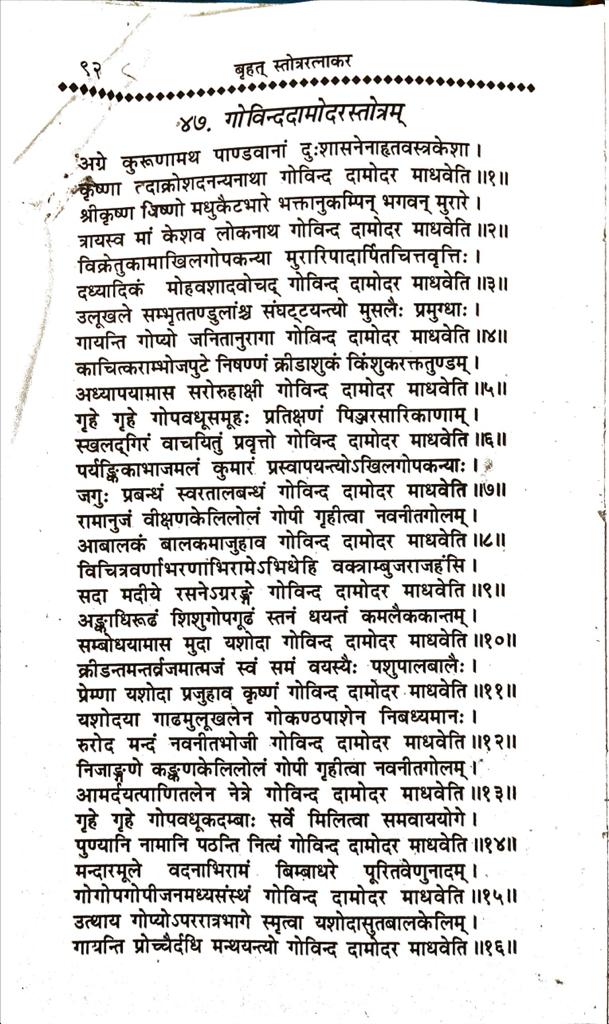
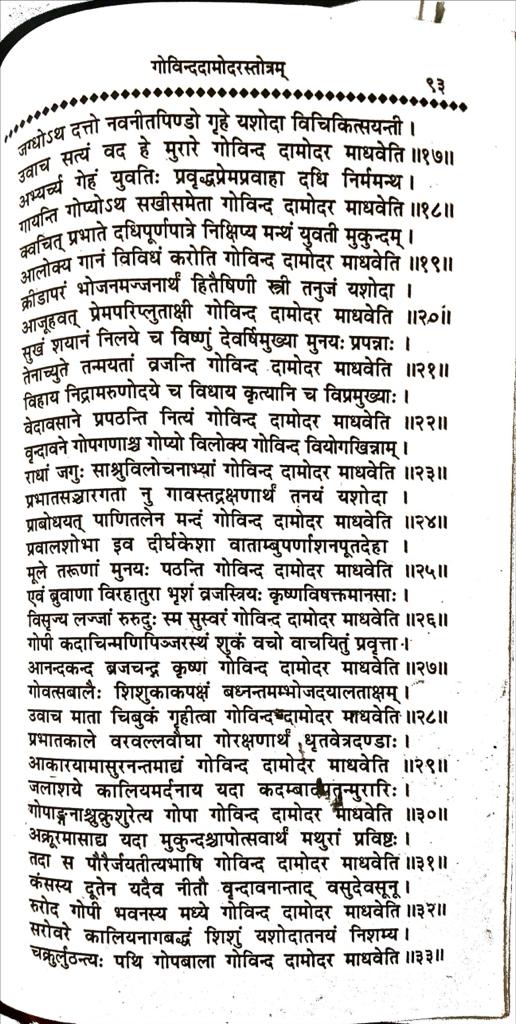
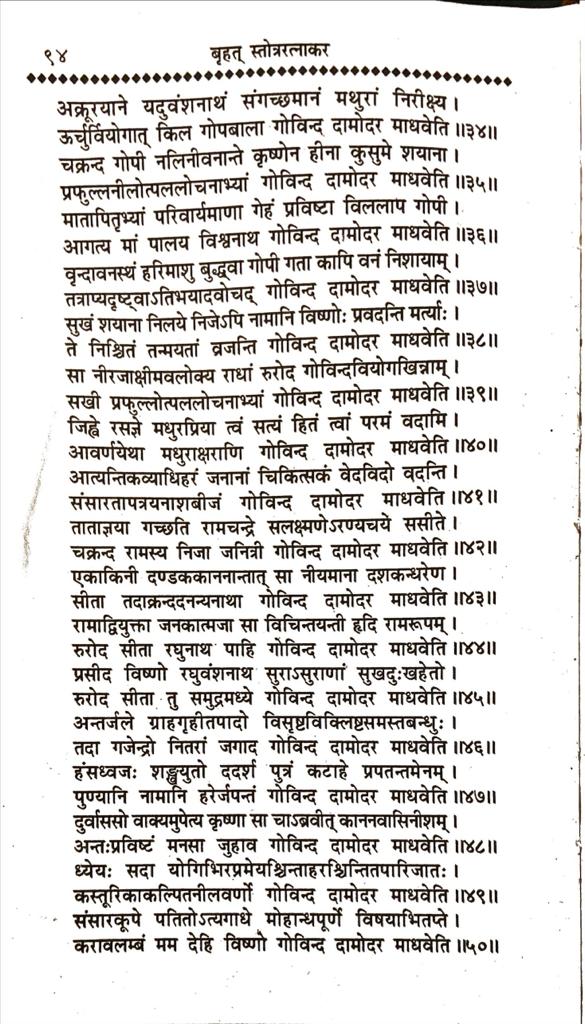
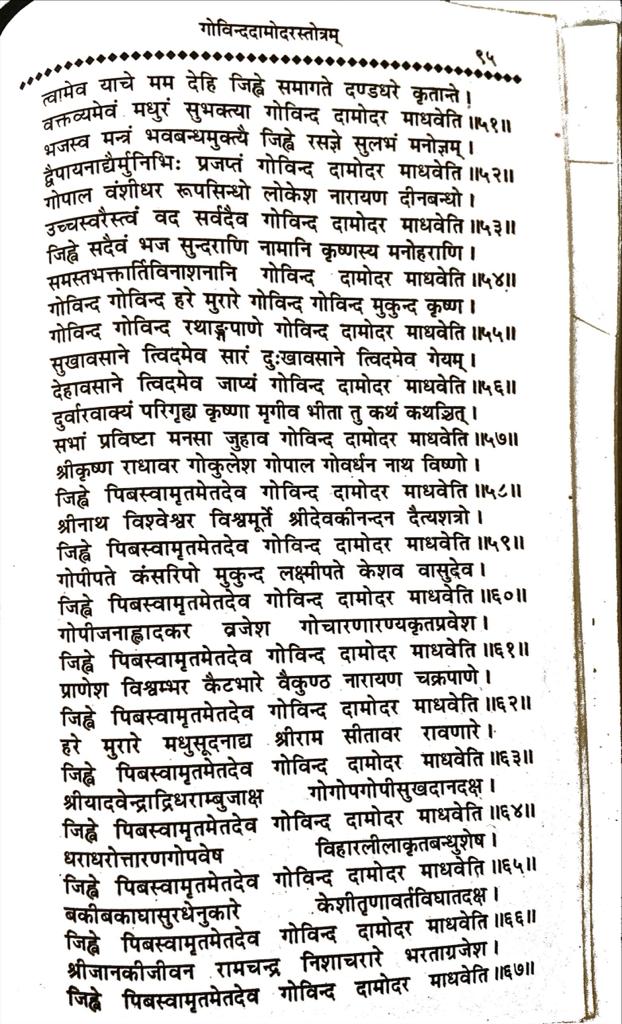
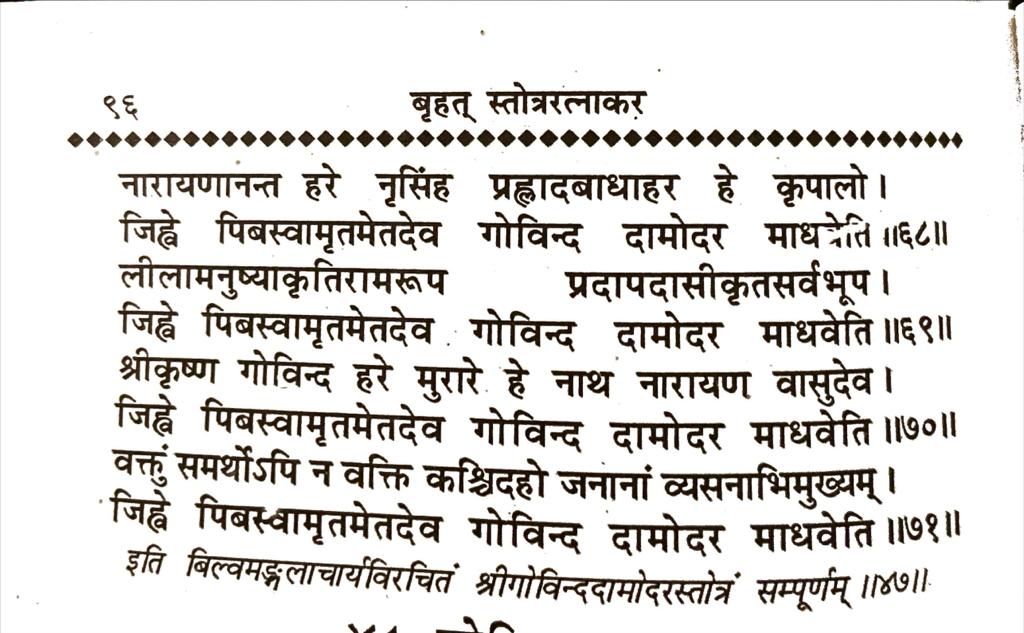
Meaning in English
Before the assembled Kurus and Pandavas, when Duhsasna caught Draupadi’s hair and clothing and dragged her into the amphitheater then, she who, having no other Lord thank Krishna, cried out, ” Govinda, Dāmodara, Mādhava!” save me, my lord.
O Lord Krishna, Viṣṇu, the enemy of the Madhu and Kaiṭabha demons; O Supreme Personality of Godhead, the enemy of Mura, merciful upon the devotees; O Keśava, Lord of the worlds, Govinda, Dāmodara, Mādhava, please deliver and protect me.
Though desiring to sell milk, curd, butter, etc., the mind of a young gopi was so absorbed in the lotus feet of Krishna that instead of calling out “Milk for sale,” they bewilderedly said, “Govinda!”, Dāmodara!”, and “Mādhava!”
Their grinding-mortars full of grains, the gopis minds are overcome as they thresh with their pestles, singing “Govinda, Dāmodara, Mādhava!”
A lotus-eyed girl instructed the red-beaked pet parrot that was seated in the cup of her lotus hand; she said, “Govinda, Dāmodara, Mādhava . . .”
In each and every house, a bevy of gopa-women is engaged in making the caged parrots constantly utter with broken words, “Govinda,” “Dāmodara,” and Mādhava.”
With the little boy lying in the swing, all of the gopis used to expertly sing compositions set to musical notes and rhythm; they went, “Govinda, Damodara, Madhava,” while putting Him to rest.
The younger brother of Balarama, playing mischieviously, was dodging about her with restless eyes. Taking a ball of fresh butter to lure Him over, a gopi called Him: “O Govinda, Dāmodara, Mādhava . . .”
O my tongue, since my mouth has become like a lotus by dint of the presence there of these eloquent, ornamental, delightful syllables, you are like the swan that plays there. As your foremost pleasure, always articulate the names, “Govinda,” “Dāmodara,” and “Mādhava.”
The one and only Lord of Laxmidevi, like an inconspicuous little cowherd baby, was seated in the lap of mother Yasoda, drinking her breast milk. Merged in bliss, she addressed Him as “Govinda,” “Dāmodara,” and “Mādhava.”
In Vraja-dhama, Krishna was playing with His playmates, the boys of His age who protected the animals. With great love, mother Yasoda called out to her own son, “O Govinda, Dāmodara, Mādhava!”
Being firmly tied up to the grinding mortar with a cow’s rope by mother Yasoda, the plunderer of butter softly whimpered. “Govinda, Dāmodara, Mādhava.”
In His own courtyard, Krishna was carelessly playing with a bracelet. So the gopi took a ball of butter to Him, and shutting His eyes with her palm, she distracted Him, “O Govinda, Dāmodara, Mādhava . . .(Guess what I have for you!)”
In house after house, groups of cowherd ladies gather on various occasions, and together they always chant the transcendental names of Krishna–”Govinda, Dāmodara, and Mādhava.”
His face is pleasing, and the flute at His lips is filled with Divine sound. Amidst the cows, gopas, and gopis, He stands at the base of a coral tree. Govinda, Dāmodara, Mādhava!
Having risen early in the Brahma-muhrata, and remembering the childish activities of the Son of mother Yasoda, the gopis loudly sing while churning butter–”Govinda, Dāmodara, Mādhava!”
Having churned and then set aside a fresh lump of butter in the house, mother Yasoda was now suspicious–it had been eaten. She said, “Hey–Murari! Govinda, Dāmodara, Mādhava, now tell me the truth . . .”
Having finished worship at home, a young gopi, (like) a strong current of love for Krishna, churned the butter and then joined together with all the gopis and their friends and they sing, “Govinda, Dāmodara, Mādhava!”
One time, early in the morning, just as a girl had put aside her churner in a pot full of butter–she saw Mukunda. She then began to sing songs in various ways, about Govinda, Dāmodara, and Mādhava.
(Without having even bathed or eaten,) Krishna was absorbed in play. Overwhelmed with affection, mother Yasoda, who thought only of her son’s welfare, called out, “Govinda, Dāmodara, Mādhava! (Come, take your bath and eat something.)”
Devarsi Narada and other Munis are always surrendered to Lord Visnu, who rests upon His couch. They always chant the names of “Govinda,” “Dāmodara,” and “Mādhava,” and thus they attain spiritual forms similar to His.
After giving up sleep at dawn, having completed their ritualistic duties, and at the end of their Vedic chanting, the best of the learned brahmanas always loudly chant, “Govinda, Dāmodara, Mādhava!”
In Vrindavana, seeing Srimati Radharani overwhelmed with separation from Govinda, groups of gopas and gopis sang, with tears in their lotus eyes, “Govinda! Dāmodara! O Mādhava!”
The cows have already gone out to graze early in the morning, mother Yasoda gently roused her sleeping son with the palm of her hand, softly saying, “Govinda, Dāmodara, Mādhava.”
With long, matted hair the color of coral, and bodies purified by eating only leaves, water, and air, the sages sit beneath the trees and chant, “Govinda,” “Dāmodara,” and “Mādhava.”
“After speaking these words, the ladies of Vraja, who were so attached to Krishna, felt extremely agitated by their imminent separation from Him. They forgot all worldly shame and loudly cried out,’ O Govinda! O Dāmodara! O Mādhava!’”
Sometimes a gopi is engaged in teaching a parrot within a jewelled cage to recite names like “Ānanda-Kanda” (source of bliss), “Vraja-Candra” (moon of Vraja), “Krishna,” “Govinda,” “Dāmodara,” and “Mādhava.”
The lotus-eyed Lord was tying the sikha of a cowherd boy to the tail of a calf when His mother caught Him, lifted up His chin, and said, “Govinda! Dāmodara! Mādhava!”
In the early morning, a group of His favorite cowherd boys arrived, stick canes in hand, to take care of the cows. They addressed the unlimited, primeval Personality of Godhead, “Hey, Govinda, Dāmodara, Mādhava!”
When Lord Murari jumped from the Kadamba branch into the water to chastise the Kaliya serpent, all the gopis and cowherd boys went there and cried out, “Oh! Govinda! Dāmodara! Mādhava!”
After Lord Mukunda had met with Akrura and entered Mathura to attend the ceremony of breaking the bow of Kansa, all the citizens then shouted, “Jaya Govinda! Jaya Dāmodara! Jaya Mādhava!”
When both sons of Vasudeva had actually been taken out of Vrndavana by the messenger of Kansa, Yasoda sobbed within the house, wailing, “Govinda, Dāmodara, Mādhava!”
Hearing how the son of Yasoda, who was but a child, was wrapped within the coils of the Kaliya serpent at the pond, the cowherd boys cried “Govinda! Dāmodara! Mādhava!” and scurried down the path.
Seeing the Lord of the Yadus proceeding towards Mathura upon Akrura’s chariot, the cowherd boys, upon realization of their impending separation, said, “O Govinda! Damodara, Madhava! (Where are you going? Are You actually leaving us now?)
At the edge of a lotus forest, a gopi lay down upon the bed of flowers, bereft of Krishna. Tears flowed from her lotus eyes (as she wept,) “Govinda, Dāmodara, Mādhava.”
Being very restricted by her mother and father, the lamenting gopi entered the house, thinking, “(Now that) I have arrived home, save me, O Lord of the universe! O Govinda, Dāmodara, Mādhava!”
Thinking that Krishna was in the forest, a gopi fled into the forest in the middle of the night. But seeing that Krishna wasn’t actually there, she became very fearful, and cried, “Govinda, Dāmodara, Mādhava!”
Even the ordinary mortals comfortably seated at home who chant the names of Vishnu, “Govinda, Dāmodara,” and “Mādhava,” certainly attain (at least) the liberation of having a form similar to that of the Lord.
Seeing Srimati Radharani crying from the pangs of separation from Govinda, the blooming lotus eyes of Radha’s friends also filled with tears, and she too cried, “Govinda, Dāmodara, Mādhava.”
O my tongue, you are fond of sweet things and are of discriminating taste; I tell you the highest truth, which is also the most beneficial. Please just recite these sweet syllables: “Govinda,” “Dāmodara,” and “Mādhava.”
The knowers of the Vedas say that this is the cure-all of the worst diseases of mankind and that this is the seed of the destruction of the threefold miseries of material existence–”Govinda, Dāmodara, Mādhava!”
Upon Rāmacandra’s going into the forest due to his father’s order, along with Lakshmana and Sita, (and thus becoming) a forest-rover, His mother cried, “O Govinda, Dāmodara, Mādhava!”
Left there alone, Sita was carried out of the forest by the ten-headed Ravana. At that time, accepting no other Lord, Sita cried, “O Govinda! Dāmodara! Mādhava!”
Separated from Rama, the daughter of King Janaka was completely anxious, and with the form of Rama within her heart, she cried, “O Raghunatha! Protect me! O Govinda, Dāmodara, Mādhava!”
“O Lord Vishu, be gracious! Lord of the Raghu clan, cause of the happiness and distress of gods and demons alike, O Govinda, Dāmoadara, Mādhava!” Thus Sita cried, (by the time she had been carried) over the middle of the ocean.
Caught by his foot and pulled into the water, Gajendra, his friends all harassed and frightened away, then called out incessantly, “Govinda, Dāmodara, Mādhava!”
Along with his priest Sankhayuta, King Hamsadhvaja saw his son Sudhanva falling into a vat, but the boy was chanting the transcendental names of Hari, Govinda, Dāmodara, and Mādhava.
Accepting Durvāsa Muni’s request (that she feed his thousands of disciples, even though she hadn’t the means to do this) Draupadi mentally called out to the Lord within, the Lord of a forest dweller (like her), and she said, “Govinda, Dāmodara, Madhava!”
He is always meditated upon by the yogīs as being inscrutable. He is the remover of all anxieties and is the desire tree of all that is desirable. His bluish complexion is as attractive as Kasturika. Govinda! Dāmodara! Mādhava!
I am fallen into the deep, dark well of material life, which is full of illusion and blind ignorance, and I am tormented by sensual existence. O my Lord, Vishnu, Govinda, Dāmodara, Madhava, please grant me Your supporting hand to uplift me.
O my tongue, I ask only this of you, that at my meeting the bearer of the scepter of chastisement (Yamaraja), you will utter this sweet phrase with great devotion: “Govinda, Dāmodara, Mādhava!”
O my tongue, O knower of rasa, for release from the hellish bondage of material existence, just worship the charming, easily obtainable mantra that is chanted by Vedavyasa and other sages: “Govinda, Dāmodara, Mādhava!”
You should always and everywhere just loudly chant, “Gopala, Vansidhara, O ocean of beauty, Lord of the worlds, Narayana, O friend of the poor, Govinda, Dāmodara,” and “Mādhava.”
O my tongue, just always worship these beautiful, enchanting names of Krishna,”Govinda, Dāmodara,” and “Mādhava,” which destroy all the obstacles of the devotees.
“O Govinda, Govinda, Hari, Murari! O Govinda, Govinda, Mukunda, Krishna! O Govinda, Govinda! O holder of the chariot wheel! O Govinda! O Dāmodara! O Mādhava!”
This indeed is the essence (found) upon ceasing the affairs of mundane happiness. And this too is to be sung after the cessation of all sufferings. This alone is to be chanted at the time of death of one’s material body–”Govinda, Dāmodara, Mādhava!”
Somehow or other accepting the unavoidable command of Duḥsasana, Draupadi, like a frightened doe, entered the assembly of princes and within her mind cried out to the Lord, “Govinda, Dāmodara, Mādhava!”
O tongue, drink only this nectar (of the names), “Sri Krishna, dearmost of Srimati Radharaṇi, Lord of Gokula, Gopala, Lord of Govardhana, Vishnu, Govinda, Damodara,” and “Madhava.”
“Srinatha, Lord of the universe, form of the universe, beautiful son of Devaki, O enemy of the demons, Govinda, Damodara, Madhava!” O my tongue, just drink this nectar.
“Lord of the gopis, enemy of Kansha, Mukunda, husband of Laxmidevi, Keshava, son of Vasudeva, Govinda, Damodara, Madhava!” O my tongue, just drink this nectar.
“O You who give bliss to the gopis! Lord of Vraja, You who have entered the forest for herding the cows, O Govinda, Damodara, Madhava!” O my tongue, just drink this nectar.
“O Lord of my life! Upholder of the universe, foe of Kaitabha, Vaikuntha, Narayaṇa, holder of the Sudarsana-cakra! Govinda, Damodara, Madhava!” O my tongue, just drink this nectar.
“O Lord Hari, enemy of Mura, Madhusudana, Sri Rama, dearmost of Sita, enemy of Ravaṇa, Govinda, Damodara, Madhava!” O tongue, now just drink this nectar.
“O best of the Yadus, O bearer of Govardhana hill, O lotus-eyed expert in giving happiness to the cows, the gopas, and the gopis, Govinda, Damodara, Madhava!” O tongue, please just drink this nectar.
“O uplifter of the earth’s burdens in the guise of a cowherd boy, Lord of sportive pastimes in which Ananta-sesha has become Your brother! O Govinda, Damodara, Madhava!” O my tongue, just drink this nectar.
“O enemy of Baki (Putana), Bakasura, Aghasura, and Dhenuka, O Lord who expertly smashed Keshi and Tṛṇavarta!” O tongue, just drink this nectar–”Govinda, Damodara, Madhava!”
“O Ramacandra, O life and soul of the beautiful daughter of Janaka Maharaja, enemy of the night-roving demons, O elder brother of Bharata!” O my tongue, just drink this nectar–”Govinda, Dāmodara, Mādhava!”
“O Lord Narayaṇa, Ananta, Hari, Naṛsimhadeva, remover of the afflictions of Prahlada, O merciful Lord! Govinda, Damodara, Madhava!” O my tongue, simply drink this nectar.
O Lord who assumed the man-like form of Rama, who by dint of Your prowess, turned all other kings into Your servants! “O Govinda, Damodara, Madhava!” O tongue, just drink this nectar.
“Sri Krishna! Govinda! Hari! Murari! O Lord, Narayaṇa, Vasudeva!” O tongue, please drink only this nectar–”Govinda, Damodara, Madhava!”
Even though anyone is able to chant, still no one does. Alas! How determined people are for their own undoing! O tongue, just drink the nectar of these names–”Govinda, Damodara, Madhava!”
Thus the Sri Govinda Damodara Stotram composed by Sri Bilvamangalacharya is completed.

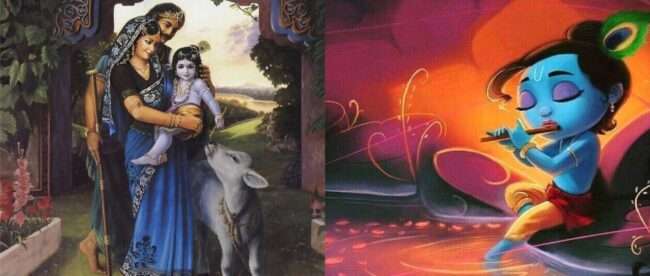
Thanks, Shubhra ji for giving this wonderful stotra with meaning. Namasthe..Namasthe..May the blessings of Lord Krishna be on you
Thank you for your appreciation! I am grateful for your wonderful words!